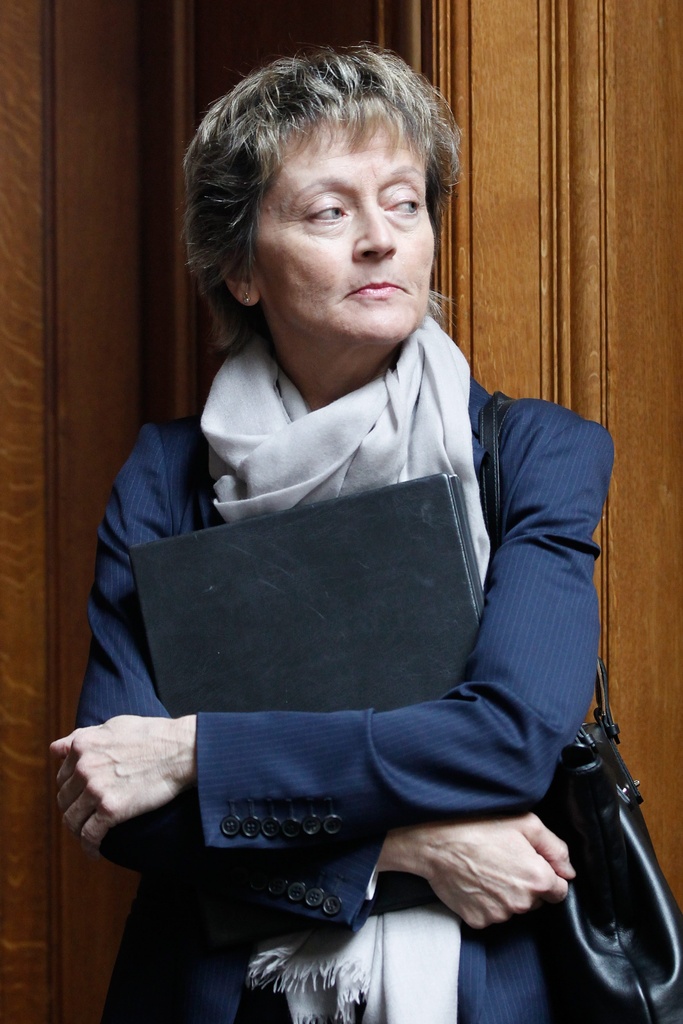Regulator demands more tax transparency

The Swiss financial regulator has broken ranks with the financial community by calling for a greater exchange of tax and regulatory information with other countries.
The Swiss Financial Market Supervisory Authority (Finma) statement comes at a time when the government is trying to get around demands from the European Union for an automatic exchange of bank client data.
Finma director Patrick Raaflaub warned that Switzerland would lose its competitive edge unless the tax evasion row, that has been hanging over the sector for the last three years, is resolved once and for all.
“I very much question if wealth management in Switzerland can remain a world market leader,” he told Finma’s annual media conference in Bern on Tuesday. “Increased access to bank data is unavoidable.”
However, Raaflaub stopped short of calling for an automatic exchange of information.
Switzerland has already bowed to international demands for greater tax transparency by loosening its grip on client data, despite complaints that this has diluted banking secrecy laws.
Earlier this year the Swiss parliament conceded further ground by agreeing to pass on information to countries investigating tax evasion cases even if the client’s name could not be provided.
“Radical rethink” needed
But the government has stood firm on its principle of denying an automatic exchange of information when a foreign client opens an account in Switzerland regardless of whether they are under suspicion or not.
Instead, negotiators are attempting to sidestep the pressure by means of withholding tax deals with Britain and Germany. A revised treaty with Britain was unveiled last week that promised to swerve around legal objections from the European Commission.
The EC has yet to comment on the new treaty which has also to be voted on by the British parliament. German politicians have voiced dissent with a similar Rubik deal with that country.
Speaking on Tuesday, Raaflaub was clear that the proper way to solve the problem was with enhanced bank data exchanges. While recognising Swiss efforts to purge tax evasion assets, he nevertheless urged a “radical rethink” to address growing international demands for more data.
“Restricting administrative assistance as much as possible and only supplying the client details that are absolutely necessary to foreign partner authorities in both the tax and supervisory fields was a conscious and politically accepted decision enshrined in law for many decades,” he said.
“As regards the international collaboration between authorities especially, it is clear that Switzerland’s restrictive approach is no longer meeting international expectations.”
“No tax mandate”
Raaflaub declined to comment on exactly how much more ground Switzerland should concede, saying only that Finma had a “considerable interest” in a reciprocal exchange of information from other countries.
Nor would Raaflaub give his view on the Rubik treaty route or the ongoing negotiations with the United States about implementing the Foreign Account Tax Compliance Act. Fatca, that is due to come into force next year, would compel any foreign bank to automatically hand over details of US clients that deposit money overseas.
Five major European countries appear to be setting a global Fatca template by negotiating a future reciprocal exchange of information with the US.
The Swiss Bankers Association (SBA) rejected Raaflaub’s concerns, arguing that the regulator has no authority to intervene in such matters.
“Banks are contributing to a stable and well supervised financial centre by providing complete and high quality information on their business and by fully co-operating with the concerned authorities,” the SBA said in a statement. “Finma has no mandate in tax policy, we do not understand its call for further international co-operation in this field.”
Controversial decision
Finma does not have any direct role in tax evasion negotiations, but the body does have authority to intervene if it believes the financial sector is at risk.
In 2009, Finma controversially ordered the release of data relating to hundreds of UBS clients when the Swiss bank faced charges of aiding and abetting tax evasion in the US.
A year later the Federal Administrative Court ruled that Finma had overstepped its authority. But the decision was reversed in 2011 by the Supreme Court on the grounds that the charges threatened the stability of the Swiss economy.
With the government now acting vigorously to douse the tax evasion fire, the chances of Finma stepping in again with the same force are limited.
But the regulator said it was still duty bound to report to politicians its concerns that a lack of tax transparency could continue to undermine the financial sector.
“Facilitating or quietly tolerating tax evasion by foreign clients cannot be a viable business model,” Raaflaub said. “A legal framework that permits tax evasion has nothing more to do with quality [of wealth management services] in today’s world.”
UBS became the first Swiss bank to fall foul of US justice when it was fined $780 million in 2009 for aiding and abetting tax evaders.
The following year, the Swiss government agreed to hand over nearly 4,500 UBS clients to Washington. The deal was ratified by parliament last year.
The US Department of Justice currently suspects 11 other Swiss banks or the Swiss-based operations of the same offences. More seriously, some are alleged to have poached clients from UBS.
One of those banks, Wegelin, sold most of its business to the Raiffeisen banking group in January – effectively marking the end of Wegelin.
The following month, the US indicted Wegelin for aiding and abetting tax evaders, the first time a foreign bank has been formally charged in such a way in the US.
In Europe, Switzerland attempted to ease calls for an automatic exchange of information by cutting deals with Britain and Germany to instead pay a withholding tax on client assets.
The treaties look likely to be rejected by Germany’s parliament while the European Commission has threatened legal action if they come into force.
Germany, Britain, France, Spain and Italy look on course to conclude a deal with the US on complying with a new US law called the Foreign Account Tax Compliance Act (Fatca).
Fatca would force all countries to automatically hand over information on US citizens holding accounts with their banks.
Experts agree that Switzerland will have little choice but to also comply with this strict legislation that will come into force next year. There are also fears that the EU may come up with similar legislation.

In compliance with the JTI standards
More: SWI swissinfo.ch certified by the Journalism Trust Initiative













You can find an overview of ongoing debates with our journalists here . Please join us!
If you want to start a conversation about a topic raised in this article or want to report factual errors, email us at english@swissinfo.ch.